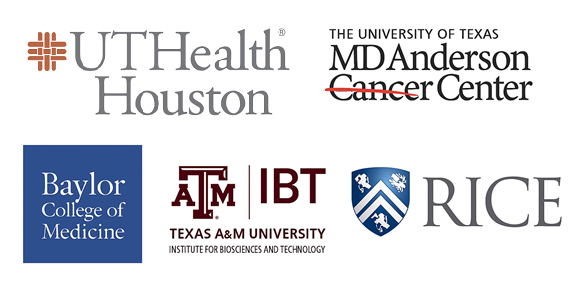Molecular Basis of Infectious Disease (MBID) Training Program
The MBID training group began in 1996 as a multi-institutional consortium of investigators in the molecular mechanisms of microbial virulence, anti-microbial resistance, host responses, genomics and genetics. It has grown into a highly interactive community of dozens of faculty, their students, and staff. The MBID T32 training grant supports this community through four pre-doctoral fellowships and by nucleating inter-institutional interactions via a monthly research-in-progress seminar, usually by trainees, and an annual region-wide symposium that combines keynote talks with trainee presentations.
The Molecular Basis of Infectious Disease (MBID) training program crosses institutional boundaries within the cohesive Texas Medical Center and includes :

The University of Texas Health Science Center at Houston (UTHealth Houston)
The University of Texas M.D. Anderson Cancer Center (MDA)
Baylor College of Medicine (BCM)
Texas A&M University Institute for Biosciences and Technology (IBT)
Rice University
Program Goals
The MBID training program seeks to
1) provide an optimal environment for training new scientists in cutting-edge concepts and techniques in microbiological research
2) foster a deep understanding of current challenges in clinical infectious diseases
3) teach critical thinking skills that prepare students for impactful research careers in which they contribute to and influence research efforts that lead to innovative and effective solutions for important infectious disease problems
(4) promote a community network that enables and empowers students to reach across institutional, discipline, and intellectual boundaries to access the expertise and technology they need to solve cutting-edge problems
Our training program is multi-faceted, accommodates student’s requirements at their home institutions, and provides a professional network of peer and faculty contacts that last far beyond the fellow’s appointment to the MBID program. Our affiliation with the Gulf Coast Consortium brings the MBID Fellows together with more than a dozen other T32-supported training programs, including the Texas Medical Center Program in Anti-Microbial Resistance (TP-AMR). MBID Fellows are paired with TP-AMR Fellows as a peer-mentoring network.
MBID Training Grant Faculty
- Michael C. Lorenz, Ph.D. – MBID Training Grant Director
- Julian Hurdle, Ph.D. – MBID Training Grant Co-Director
- Natasha Kirienko, Ph.D. – MBID Training Grant Co-Director
- Robert Britton, Ph.D.
- Danielle A. Garsin, Ph.D.
- Blake Hanson, Ph.D.
- Anna Konovalova, Ph.D.
- Anne‑Marie Krachler, Ph.D.
- Jayhun Lee, Ph.D.
- Katherine Lemon, M.D., Ph.D.
- Anthony Maresso, Ph.D.
- Timothy G. Palzkill, Ph.D.
- Kathryn Patras, Ph.D.
- Joseph Petrosino, Ph.D.
- Samuel Shelburne, M.D., Ph.D.
- Jennifer Walker, Ph.D.
- Yi Xu, Ph.D.
- Lynn Zechiedrich, Ph.D.
Ph.D. Fellowships
The MBID Training Grant currently sponsors four Ph.D. students per year. Eligible students must:
– Be a member in good standing of a Ph.D. graduate program and have completed their first year of study.
– Have a research project in microbial pathogenesis.
– Be a U.S. citizen or permanent resident.
– Be affiliated with one of the MBID Training Grant Faculty.
Candidates for MBID Training Grant positions will be reviewed and appointed annually. Please contact Dr. Michael Lorenz or Dr. Vicki Alger for more information.
Annual Retreat
The MBID Training Grant sponsors an annual research retreat every May.